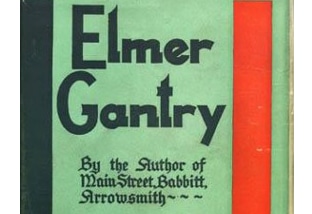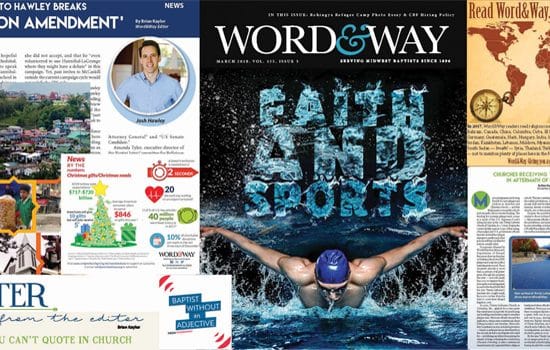Word&Way Editor
 The year 1896 was memorable for several reasons:
The year 1896 was memorable for several reasons:
• John Philip Sousa wrote “Stars and Stripes Forever.”
• Yosemite became a national park.
• Motion pictures premiered, and the first movie theater in America opened, charging 10 cents to enter.
• Tootsie Roll was born.
• The first modern Olympic Games were held in Athens.
• Henry Ford drove his first Ford through the streets of Detroit.
• Wilhelm Roentgen discovered X-rays.
• Patents were issued for the zipper, the dial telephone, the radio, the electric stove and an electric light bulb socket with a pull.
Amidst all of these was an event that turned out to be of singular importance to Missouri Baptists. In July 1896, Sanford M. Brown established a newspaper for Baptists, naming it Word&Way. Today, 110 years later, the newspaper is alive and well.
Word&Way was not the first Baptist newspaper in Missouri. Adrian Lamkin, then director of the Partee Center for Historical Baptist Studies in Liberty, noted in a centennial series in 1996 that Missouri Baptists made a half-dozen attempts at starting papers during the half century before 1896. Those efforts resulted in the Missouri Baptist, which later changed its name to the Missouri and Illinois Baptist, the Western Watchman, another paper called the Missouri Baptist, The Missouri Baptist Journal, The Record and The Central Baptist.
The Central Baptist began in 1866 and operated out of St. Louis. It was going strong when Word&Way burst onto the scene 30 years later in Kansas City. Even Word&Way’s Brown, a former assistant editor of The Central Baptist, regarded it as the “regular denominational paper,” and he did not intend Word&Way to be a threat. But Brown did want to present a different point of view on issues like the authority of the Bible, Landmarkism and the place of women in the home.
Increasingly, the General Association came to feel that the state needed just one newspaper, lest the unity of Missouri Baptists be threatened. In 1912, Word&Way purchased The Central Baptist mailing list and published a single newspaper under the banner The Word&Way and The Central Baptist. The Central Baptist was dropped from the name in 1947. Because of the merger, Word&Way today represents 140 years of continuous newspaper service to Missouri Baptists.
Founder Sanford Brown was the first of eight editors of Word&Way to date. He was particularly suited for the task with his service on The Central Baptist’s staff, his background as a pastor and his service as executive secretary of the General Association.
Brown was the paper’s field man while his co-editor, Robert K. Maiden, was charged with the day-to-day routine of getting out a weekly newspaper. The pair worked together from 1896 until 1929, when Maiden retired.
Maiden was succeeded by Brown’s son, Joseph, thus forming a father-son team as co-editors. When the founding editor died in 1938, his son became the first single editor of the newspaper and served until 1945, when the General Association purchased Word&Way.
With new ownership came a new editor, Lewis A. Myers, who was a World War II chaplain and former editor of the Baptist newspaper in Arkansas. He began in 1946 and served until the fall of 1947, when he took a similar position with the paper in New Mexico.
The next editor, H.H. McGinty, had only limited editorial experience, but he was convinced of the value and importance of Word&Way. McGinty came to the role from the pastorate of First Baptist Church, Cape Girardeau, and retired in 1967 after 20 years of service.
Ross Edwards, pastor of Swope Park Baptist Church, Kansas City, was tapped to succeed McGinty. Lamkin noted that Edwards “previously had a remarkable career as a leader among Baptists at the state and national levels. These experiences served him well as he edited the Word&Way during a very stormy time in Missouri Baptist life.”
Divisions among Baptists in the state in the 1970s led directly to Edwards’ resignation in 1975 after eight years of service.
The next editor, Bobby S. “Bob” Terry, came on the scene as Missouri Baptists moved the newspaper away from an inordinate amount of control by the executive director. The newspaper focused on matters that unified Missouri Baptists and promoted state convention causes.
Terry expanded the editorial staff to include the editor, a managing editor and two news writers, along with a capable staff to handle business, financial and circulation matters. The newspaper garnered a number of awards from the Baptist Communicators Association, Associated Church Press and the Evangelical Press Association, a tradition that continues today.
Terry resigned in 1995 to assume the editorship of The Alabama Baptist, and I succeeded him in 1996 during Word&Way’s centennial year. The newspaper became a separate agency of the Missouri Baptist Convention on Jan. 1, 2001. Later that year, in the midst of bitter infighting among Missouri Baptists, Word&Way trustees amended the paper’s articles of incorporation to provide for self-election of trustees.
Word&Way’s longevity is no fluke.
Its leaders have shared a common commitment to operate the newspaper to undergird the common work of Missouri Baptists. While Word&Way always has served a promotion function, one of its earmarks has been to “tell the truth and trust the people.”
Truth-telling has meant honestly reporting open conflict, the struggles of institutions and occasionally addressing the failure of leaders. We have sometimes said that we report “warts and all.”
Our staff and trustees take pride in serving all Missouri Baptists and reporting the work of every Missouri Baptist institution. We stand on the shoulders of those who preceded us and are indebted to all of them.
We thank our readers, advertisers and financial supporters for keeping the dream of Sanford Brown and others alive. We are grateful for the opportunity to serve Baptists in Missouri and beyond.
(A special thanks to Adrian Lamkin, whose historical work on the occasion of Word&Way’s centennial was a source for this column.)





